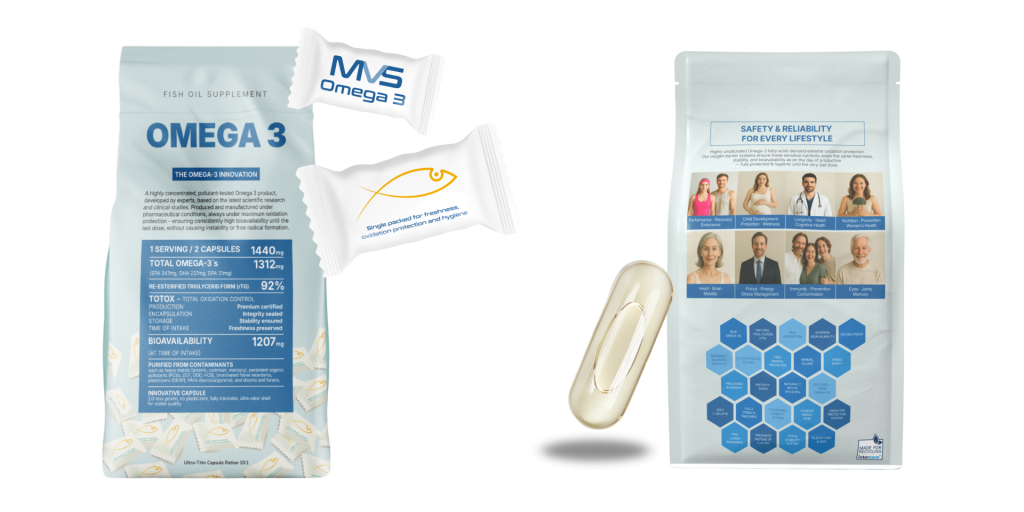Table of Contents
Introduction: A Natural Ally Against Inflammation
Arthritis is one of the most common chronic conditions worldwide, affecting over 350 million people. It’s not a single disease but a group of conditions marked by joint pain, inflammation, stiffness, and reduced mobility. Among the different types, osteoarthritis (OA) and rheumatoid arthritis (RA) are the most prevalent.
While modern medicine offers medications to reduce pain and control inflammation, side effects and long-term risks have driven growing interest in nutritional strategies to complement treatment. Among these, Omega-3 fatty acids (EPA and DHA) stand out as one of the most studied and effective natural approaches.
In 2025, decades of research confirm that Omega-3s can reduce joint inflammation, ease pain, improve mobility, and potentially slow disease progression — making them an important part of an evidence-based approach to arthritis management.
What Is Arthritis and How Does Inflammation Play a Role?
- Osteoarthritis (OA): OA is a “wear-and-tear” condition where joint cartilage gradually breaks down, leading to pain, stiffness, and reduced range of motion. While mechanical stress is a factor, inflammation now appears to be a key driver in disease progression.
- Rheumatoid Arthritis (RA): RA is an autoimmune condition where the immune system attacks joint tissue, causing swelling, pain, and sometimes systemic effects. It’s strongly linked to chronic inflammation and immune dysregulation.
- Shared Mechanisms: In both OA and RA, inflammatory mediators like prostaglandins and cytokines (IL-6, TNF-α) damage joint tissue. This not only causes pain and swelling but also accelerates cartilage and bone breakdown. Omega-3s directly target these inflammatory pathways, offering a complementary approach to traditional treatment.
How Omega-3s Work in Arthritis
- Anti-Inflammatory Powerhouse: EPA and DHA reduce the production of inflammatory molecules (like arachidonic acid-derived prostaglandins) and increase anti-inflammatory compounds called specialized pro-resolving mediators (SPMs). These help “switch off” chronic inflammation and support tissue repair.
- Modulation of Immune Response: In RA, Omega-3s help rebalance immune function, reducing the overactive immune response that attacks joint tissue.
- Joint Lubrication and Cartilage Protection: Omega-3s improve the quality of synovial fluid, the lubricant inside joints, and may protect cartilage cells from inflammatory damage.
- Systemic Effects: Beyond the joints, Omega-3s lower systemic inflammation, improve cardiovascular health (important in RA patients), and support mental resilience against chronic pain.
Latest 2023–2025 Research on Omega-3s and Arthritis
According to a Meta-analysis (2023, Rheumatology International), patients with RA taking 2.7 g/day EPA+DHA for 12 weeks showed significant reductions in morning stiffness, tender joint count, and pain scores compared to placebo.

- Clinical trial (2024, Osteoarthritis Cartilage): Older adults with OA supplementing with 1.5 g/day EPA+DHA had improved walking distance, reduced knee pain, and less need for NSAIDs.
- Systematic review (2025): Omega-3 supplementation led to measurable improvements in physical function and quality of life in both OA and RA patients, with effects increasing over time.
Omega-3 Arthritis Benefits
- Reduced Joint Pain and Stiffness: Numerous clinical trials show that Omega-3 supplementation reduces pain intensity and morning stiffness in RA, while improving joint comfort in OA.
- Improved Mobility and Physical Function: Omega-3s help joints move more easily by reducing inflammation and improving lubrication.
- Lower Dependence on NSAIDs: Several studies found that patients taking Omega-3s needed fewer non-steroidal anti-inflammatory drugs (NSAIDs), reducing the risk of side effects like stomach irritation.
- Protection of Cartilage and Slowing of Disease Progression: Omega-3s may reduce enzymes that degrade cartilage, potentially slowing the progression of OA.
- Cardiovascular and Mental Health Support: People with RA have a higher risk of cardiovascular disease and depression. Omega-3s lower triglycerides, support heart health, and improve mood resilience.
How Much Omega-3 for Arthritis? (2025 Guidelines)
- General joint support: 1000 mg/day EPA+DHA.
- Rheumatoid arthritis or severe inflammation: 2000–3000 mg/day EPA+DHA (often high-EPA formulas).
- Maintenance after improvement: 1000–1500 mg/day.
Pro tip: Always take Omega-3s with meals containing fat to maximize absorption. Improvements are often noticeable after 8–12 weeks of consistent use.
Food vs Supplements for Arthritis
| Source | Pros ✅ | Cons ❌ |
|---|---|---|
| Food (Fish, Algae, Nuts/Seeds) | – Natural nutrients (protein, vitamin D, selenium) plus Omega-3. – Algae = vegan DHA source. | – Many people with arthritis don’t eat enough fish weekly. – Large fish may contain mercury, PCBs, and microplastics. – Plant ALA converts poorly to DHA/EPA. – Intake is inconsistent. |
| Supplements (Purified Omega-3) | – Deliver consistent, measurable EPA+DHA doses. – Purified from contaminants. – rTG form = superior absorption. – Double packaging preserves freshness. – Convenient daily use. | – Many people with arthritis don’t eat enough fish weekly. – Large fish may contain mercury, PCBs, microplastics. – Plant ALA converts poorly to DHA/EPA. – Intake is inconsistent. |
Key takeaway: Combining safe dietary sources with high-quality Omega-3 supplements in rTG form ensures both adequacy and safety.
Choosing the Right Omega-3 Supplement for Arthritis
When selecting an Omega-3 supplement, look for:
- Re-esterified triglyceride (rTG) form — best absorption and stability.
- Low oxidation values (TOTOX) — freshness and potency.
- Purity — free from heavy metals, PCBs, dioxins, and microplastics.
- Third-party testing — transparency and assurance for long-term safety.
MVS Omega-3 — Setting a New Standard in Purity, Stability, and Bioavailability
Developed by MVS Pharma’s medical and pharmaceutical experts, MVS Omega-3 represents a new generation of scientifically designed Omega-3 supplements. With a 92% natural rTG structure, verified bioavailability of 1207 mg, and our proprietary T-TOX™ oxidation control system, it ensures exceptional purity, stability, and absorption. Each batch meets European Pharmacopeia standards and is tested for over 20 potential contaminants — setting a benchmark for transparency and trust in modern nutritional science.

Not all Omega-3 supplements are created equal. The more unsaturated and effective Omega-3 molecules become, the more sensitive they are to air exposure — making oxidation protection the single most critical factor for preserving both safety and bioavailability. Once oxidation begins, oil turns rancid, loses efficacy, and may even generate free radicals.
At MVS Pharma, this challenge defined our mission. We engineered MVS Omega-3 as a next-generation formulation designed for uncompromised purity, verified stability, and maximum biological usability.
Key Facts:
- 90% Purified Omega-3 Concentration — delivering 1440 mg total oil with 1312 mg active Omega-3s (EPA 784 mg, DHA 518 mg) per serving.
- 92% Re-esterified Triglyceride (rTG) Form — structurally identical to natural fish oil for superior absorption (1207 mg bioavailable) and full physiological compatibility.
- T-TOX™ Total Oxidation Control System — exclusive German oxidation-management technology ensuring freshness and molecular integrity from production to the last capsule.
- Dual-Layer Packaging Protection — prevents oxidation, preserves hygiene, and guarantees stability throughout the product’s entire lifecycle.
- Ultra Thin Capsule Release 3.0™ — 2/3 less gelatin, no plasticizers, and >91% active ingredient load for transparency, purity, and optimized payload.
- Natural Tocopherol Matrix (α, β, γ, δ) — balanced antioxidant system calibrated to protect high-purity oil without destabilization.
- Pharma-Standard Purification & Testing — each batch is verified to meet European Pharmacopeia standards and is screened for over 20 contaminants, including heavy metals, PCBs, dioxins, PAHs, and plasticizers.
The result is an ultra-pure, oxidation-protected Omega-3 supplement that maintains its natural structure, freshness, and full efficacy until the final dose — ensuring consistent support for cardiovascular, cognitive, visual, and immune health.
Summary: Omega-3 as a Natural Support for Arthritis
In 2025, Omega-3 fatty acids are recognized as a cornerstone nutrient for managing arthritis naturally. They:
- Reduce joint pain, stiffness, and inflammation.
- Improve mobility and function.
- Lower dependence on pain medication.
- Support cartilage protection and slow disease progression.
- Enhance cardiovascular and mental well-being.
With most diets falling short, rTG-form, oxidation-protected Omega-3 supplements are the safest and most effective way to secure these benefits.
Disclaimer: As a service to our readers, MVS Pharma GmbH publishing provides access to our library of archived content in our blog. Please note the date of the last review or update on all articles. No content on this site should ever be used as a substitute for direct medical advice from your doctor or other qualified clinician.
FAQs
-
Can Omega-3s really help with arthritis pain?
Yes. Multiple studies show Omega-3 supplementation reduces pain and stiffness, especially in RA.
-
How long does it take to see improvement in arthritis symptoms from taking omega-3 supplements?
Most people notice improvements in their arthritis symptoms after 8–12 weeks of consistent supplementation with a high-quality omega-3 supplement.
-
Are Omega-3 supplements safe to take with arthritis medications?
Yes, they are generally safe and may reduce the need for NSAIDs. Always consult your doctor.
-
How much Omega-3 should I take for arthritis?
Typically 1000–3000 mg EPA+DHA daily, depending on severity.
-
Do Omega-3 fatty acids/supplements rebuild cartilage?
They don’t rebuild cartilage directly but reduce enzymes that degrade it, helping slow progression.
-
What makes MVS Pharma Omega-3 different?
It offers oxidation resistance, superior absorption in rTG form, full safety testing, and double protection packaging — ensuring purity and potency from production to consumption.
Sources:
- Journal of Orthopedic Surgery and Research: “Effect of omega-3 polyunsaturated fatty acids supplementation for patients with osteoarthritis: a meta-analysis”
- National Library of Medicine: “The Effect of Omega-3 Fatty Acids on Rheumatoid Arthritis”


